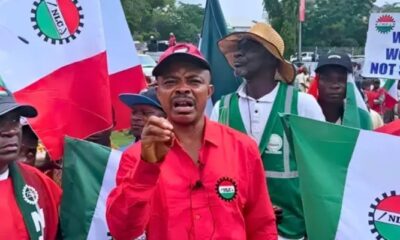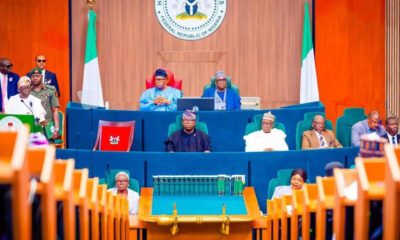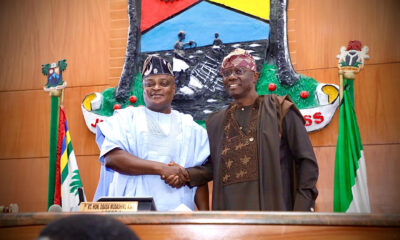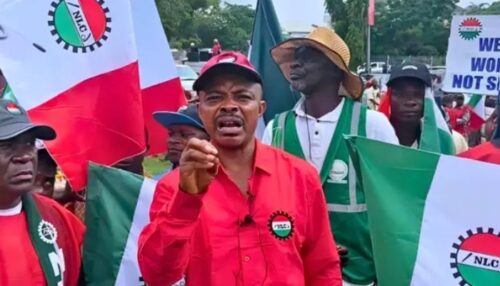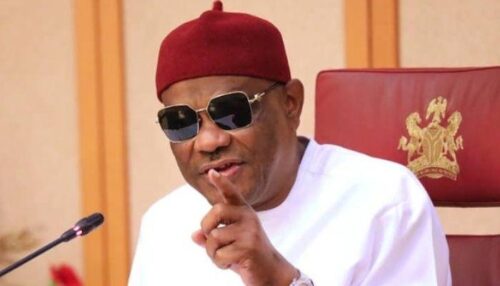
Three weeks after the night raid on their homes by security agencies, the Federal Government will, today, formally file corruption charges against three senior court judges out of the seven, who were arrested and quizzed, last month.
The three jurists, whose cases are being filed today before the Federal High Court in Abuja, are Justices John Inyang Okoro and Sylvester Ngwuta of the Supreme Court, and a Federal High Court judge, Justice Adeniyi Ademola.
According to Vanguard, the case files of the three suspects, border mainly on money laundering and illegal possession of firearms.
While Justices Okoro and Ngwuta are to be charged with alleged money laundering, Ademola is facing charges of alleged money laundering and illegal possession of firearms.
The judges may risk no fewer than 58 years in jail, if convicted.
Sources close to the Federal High Court in Abuja, confirmed to Vanguard that the cases are to be filed today by the Federal Government to signal a legal battle that may shake and reshape the Nigerian judiciary.
According to court records, the Federal Government is charging them to court, pursuant to Sections 104 and 379 of the Administration of Criminal Justice Act, 2015.
Specifically, Justice Adeniyi Ademola is slammed with four charges, with two bordering on alleged money laundering and others pinned on alleged illegal possession of firearms and ammunition.
Ademola’s alleged offences
COUNT ONE—STATEMENT OF OFFENCE
Money laundering, contrary to section 16 (1) (d) of Money Laundering Act 2011 (as amended) and punishable under section 16 (2) (B) of the same Act.
PARTICULARS OF OFFENCE:
“That you Adeniyi Francis Adetokunbo Ademola ‘M, 63 years, of No 32, Samuel Ogbemudia Crescent, Apo Zone E, Abuja on or about the 7th day of October, 2016 at Abuja within the jurisdiction of the Federal High Court had in your possession, cash in the sum of Fifty Four Million Naira (N54, 000, 000.00) exceeding the amount authorised under the law and you, thereby, committed an offence contrary to Section 16 (2) (d) of the Money Laundering Act 2011 (as amended).
COUNT TWO — STATEMENT OF OFFENCE
Money laundering, contrary to Section 16 (1) (d) of Money Laundering Act 2011 (as amended) and punishable under Section 16(2) (b) of the same Act.
PARTICULARS OF OFFENCE:
“That you Adeniyi Francis Adetokunbo Ademola ‘M’, 63 years, of No 32, Samuel Ogbemudia Crescent, Apo Zone E, Abuja on or about the 7th day of October, 2016 at Abuja within the jurisdiction of the Federal High Court had in your possession the sum of One Hundred and Twenty-One thousand, Two hundred and seventy nine United States of American Dollars ($121,279) exceeding the amount authorised under the law and you, thereby, committed an offence contrary to Section 16 (1) (d) of Money Laundering Act, 2011 (as amended).
COUNT THREE — STATEMENT OF OFFENCE
Illegal possession of firearms contrary to Section 4 of Fire Arms Act, 2004 and punishable under Section 27 (1) (b) (I) of the same Act
PARTICULARS OF OFFENCE:
“That you Adeniyi Francis Adetokunbo Ademola ‘M, 63 years of No 32, Samuel Ogbemudia Crescent, Apo Zone E, Abuja on or about the 7th day of October, 2016 at Abuja within the jurisdiction of this Honourable Court had in your possession two Pump Action rifles without Licence and with serial numbers: AVAR MAGNUM 6084 and AVAR MAGNUM 6284 respectively and, thereby, committed an offence contrary to Section 4 of the Fire Arms Act, Cap F28 LFN 2004 and punishable under Section 27 (1) (b) (H) of the same Act.
COUNT FOUR—STATEMENT OF OFFENCE
Illegal possession of Ammunition contrary to section 8 of the Fire Arms Act, 2004 and punishable under section 27 (1) (b) (i) of the same Act.
According to legal experts, the judge could be jailed for up to one year on each count of illegal possession of firearms and ammunition, if convicted. If that applies, it means Ademola can spend up to two years on the two counts of illegal possession of firearms and ammunition and seven years each on the two counts of money laundering, bringing the total jail term to 16 years on the four counts.
Justice John Inyang Okoro of the Supreme Court
In the case of Justice Inyang Okoro of the Supreme Court, the Federal Government is slamming him with three count charges, all bordering on money laundering and the offences can land him in jail for no fewer than 21 years, if convicted.
According to lawyers familiar with money laundering offences, a suspect convicted for laundering can get a maximum of seven years on each count.
He is accused by the Federal Government of receiving $20,000 from a former Governor; N18,589,330 from a businessma, in addition to keeping the sum of $38,833.00 cash at home as at the night of October 7, 2016 when the DSS stormed his Abuja residence in search of the proceeds of crime.
He may spend up to seven years on each count of the three money laundering offences, making a total of 21 years, if convicted.
COUNT ONE – STATEMENT OF OFFENCE
Receiving gratification, contrary to Section 8 (1) of the Independent Corrupt Practices Commission Act, 2011 and punishable under the same section
PARTICULARS OF OFFENCE:
“That you John Inyang Okoro ‘Male, 57, of Lord Lugard Street, Area 11 Garki, Abuja, between the 7th August, 2014 and 16th July, 2015, corruptly received from a businessman (names withheld), through your personal bank account number 2000237945 domiciled at First Bank PLC, within the jurisdiction of this Honourable Court, the sum of Eighteen Million, Five Hundred And Eighty-Nine thousand Three Hundred And Thirty Naira (NGN 18,589,330.00) in the discharge of your official duties as a Judge of the Supreme Court of Nigeria, in contravention of, and punishable under Section 8 (1) of the Independent Corrupt Practices Commission Act, 2011.
COUNT TWO — STATEMENT OF OFFENCE
Money laundering, contrary to Section 16 (1) (d) of Money Laundering Act 2011 (as amended) and punishable under Section 16(2) (b) of the same Act
PARTICULARS OF OFFENCE:
“That you, John lnyang Okoro, adult, male, 57 years of age, on or about the 8th day of October, 2016 at 31, Lord Luguard Street, Area 11 Garki, Abula, FCT within the jurisdiction of this Honourable Court, did have in your possession in cash, without going through a financial institution, the sum of Thirty-Eight Thousand, Eight Hundred and Thirty Three US Dollars ($38,833.00) in cash, denominated in One Hundred US Dollar ($100) bills, exceeding the amount authorised under the law and you thereby committed an offence contrary to Section 16 (1) (D) of the Money Laundering Act 2011, and punishable under Section 16(2)(bH3) of the Money Laundering (Prohibition) Act, 2011.
COUNT THREE — STATEMENT OF OFFENCE
Receiving gratification, contrary to section 8 (1) of the Independent Corrupt Practices and other Related Offences Commission Act, 2000.
PARTICULARS OF OFFENCE:
“That you, John lnyang Okoro, adult, male, 57 years of age, between the 1st day of January and the 31st day of December 2011, corruptly received from a former governor (names withheld), through your personal bank account numbered 2025921238 domiciled at First Bank PLC, within the jurisdiction of this Honourable Court, the sum of Twenty Thousand US Dollars ($20,000.00) in the discharge of your official duties as a Judge of the Supreme Court of Nigeria, in contravention of, and punishable under Section 8 (1) of the Independent Corrupt Practices Commission Act, 2011.”
Justice Sylvester Ngwuta
Another Supreme Court Justice, Sylvester Ngwuta, is also facing a three-count money laundering charge and could as well spend up to 21 years in jail, if found guilty. According to the court papers, Ngwuta, like Justice Okoro, kept huge cash in local and foreign denominations, contrary to the Money Laundering Act. The DSS, which raided his home on the night of October 7, 2016, said it mopped up cash of N35.208 m, $319,596 and £ 25,890 from his home in Abuja. The judge later cried foul, and claimed the cash was planted.
COUNT ONE — STATEMENT OF OFFENCE
Money laundering, contrary to Section 16 (1) (D) of the Money Laundering Act 2011, and punishable under Section 16(2)(b)(3) of the Money Laundering (Prohibition) Act, 2011.
PARTICULARS OF OFFENCE:
“That you, Sylvester Nwali Ngwuta, adult male, 65 years of age, on or about the 8th day of October, 2016 at the 3 Arms Zone, Abuja, FCT,within the jurisdiction of this Honourable Court, did have in your possession in cash, without going through a financial institution, the sum of Thirty-Five Million, Two Hundred and Eighty Thousand Naira (NGN35,208,000.00) denominated in One Thousand Naira (NGN 1000) bills, exceeding the amount authorised under the law and you thereby committed an offence contrary to Section 16(1) (0) of the Money Laundering Act 2012.
COUNT TWO — STATEMENT OF OFFENCE
Money laundering, contrary to Section 16 (1) (D) of the Money Laundering Act 2011, and punishable under Section 16(2)(b)(3) of the Money Laundering (Prohibition) Act, 2011.
PARTICULARS OF OFFENCE:
“That you, Sylvester Nwali Ngwuta, adult, male, 65 years of age of Yellow House No. 2, Three Arms Zone, Central Area, Abuja on or about the 8th day of October, 2016 at the Yellow House No:2, Three Arms Zone, Central Area, Abuja, FCT, 3 Arms Zone, Abuja, FCT, within the jurisdiction of this Honourable Court, did have in your possession in cash, without going through a financial institution, the sum of Three Hundred and Nineteen Thousand, Five Hundred and Ninety- Six Dollars ($319,596) denominated in One Hundred US Dollar ($100) bills, exceeding the amount authorised under the law and you thereby committed an offence contrary to Section 16 (1) (D) of the Money Laundering Act 2011, and punishable under Section 16(2)(b)(3) of the Money Laundering (Prohibition) Act, 2011.
COUNT THREE — STATEMENT OF OFFENCE
Money Laundering, contrary to Section 16 (1) (D) of the Money Laundering Act 2011, and punishable under Section 16(2 of the Money Laundering (Prohibition) Act, 2011.
PARTICULARS OF OFFENCE:
“That you, Sylvester Nwali Ngwuta, adult, male, 65 years of age, on or about the 8th day of October, 2016 at the Yellow House No:2, Three Arms Zone, Central Area, Abuja, FCT, within the jurisdiction of this Honourable Court, did have in your possession in cash, without going through a financial institution, the sum of Twenty-Five Thousand Eight Hundred and Ninety Pounds Sterling (GBP25,890) denominated in Fifty Pounds Sterling (GBP50) bills, exceeding the amount authorised under the law and you thereby committed an offence contrary to Section 16(1) (D) of the Money Laundering Act 2011.”
The charges were supported by an affidavit deposed to by Moses Idakwo, of the DSS, the agency, which carried out the sting operation on the suspected judges. Idakwo said the DSS, which conducted investigation into the three cases, affirmed that the investigation had been concluded and that he had the consent of the agency to depose to the affidavit.
The officer also confirmed that a Principal State Counsel in the Office of the Department of Public Prosecutions of the Federation had confirmed to him that the opinion of the prosecution was that the investigation had so far revealed a prima facie case against the Defendants.
It was learned, last night, that the DSS would at the trial, rely on the Authority of the National Security Agencies Decree of 1986 (Cap 278 LFN) to justify its sting operation, which resulted in the huge cash and money laundering charges against the suspected judges.
Section 3 (1) of the law states: “For the purpose of facilitating the discharge of its functions under this instrument, personnel of the State Security Service, are hereby conferred with powers of a Superior Police Officer in respect of searches and arrests.”
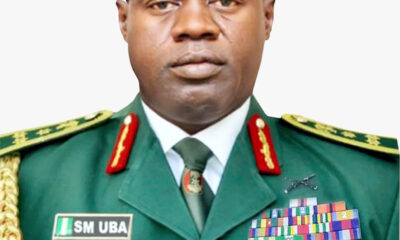
 BIG STORY4 days ago
BIG STORY4 days ago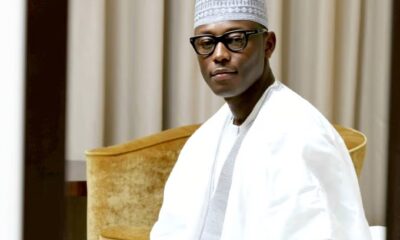
 BIG STORY4 days ago
BIG STORY4 days ago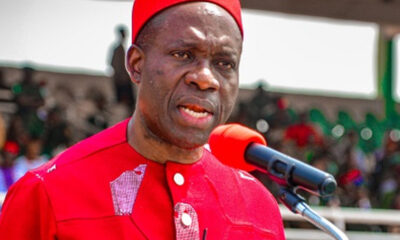
 BIG STORY4 days ago
BIG STORY4 days ago
 BIG STORY4 days ago
BIG STORY4 days ago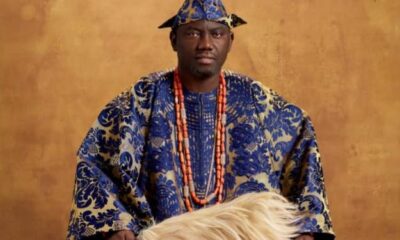
 BIG STORY3 days ago
BIG STORY3 days ago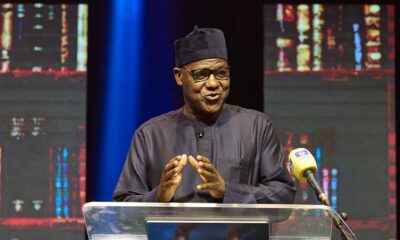
 BIG STORY4 days ago
BIG STORY4 days ago
 NEWS1 day ago
NEWS1 day ago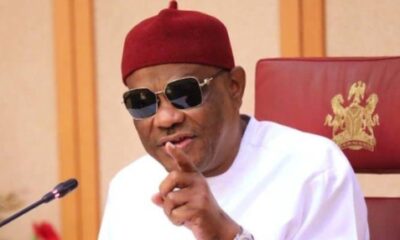
 BIG STORY2 days ago
BIG STORY2 days ago









